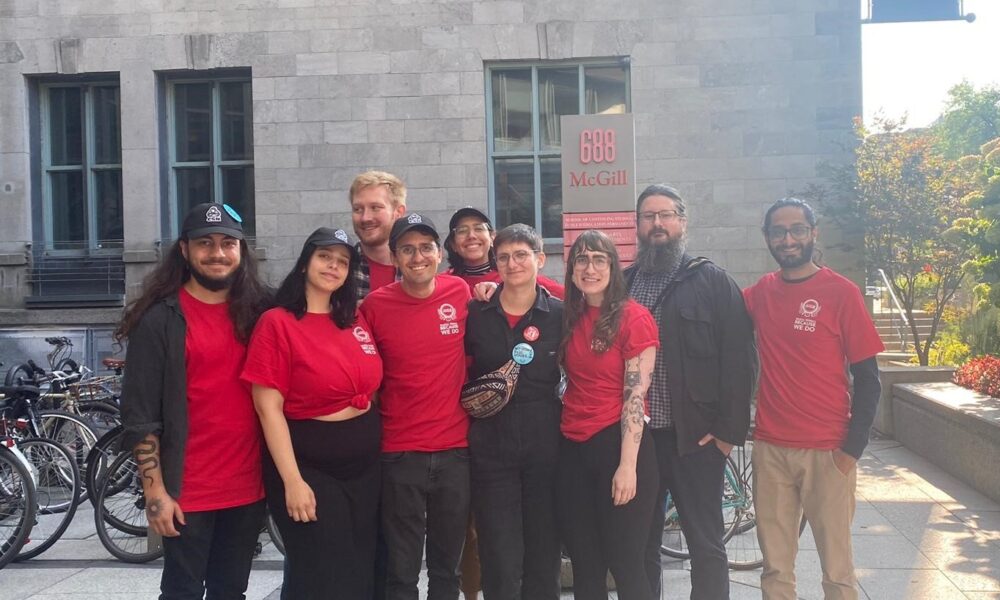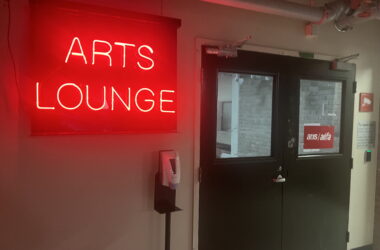The Association of Graduate Students Employed at McGill (AGSEM) commenced a series of bargaining sessions with the McGill administration on Sept. 21. AGSEM’s collective agreement with the university expired on July 31, 2023. Since then, the union has been negotiating a new collective agreement and is demanding several changes be made in their contract regarding wages, procedures for preventing sexual harassment, and health care. An hour before AGSEM and McGill’s meeting started, around thirty AGSEM members rallied outside of the meeting room in Sherbrooke 680-688, sporting bright red shirts with the slogan “United we bargain, Divided we beg” printed on the back.
Prior to the start of the negotiation process, AGSEM started their “No More Free Hours” campaign, which claims that McGill steals one million dollars in TA wages every year. Throughout negotiations, the union will meet with McGill representatives privately to come to terms about a new collective agreement that both parties deem suitable before TAs sign their new work contract.
According to the union’s recount of the session in its newsletter, the McGill administration was represented by a labour relations advisor and other individuals across departments—such as professors and administrative and human resources staff members. This group included an Associate Professor in Anatomy and Cell Biology, an Administrative Officer in Bioengineering, a Human Resources Advisor, an Administration Manager in Mathematics and Statistics, an Associate Professor in Computer Science, and a Program Administrator in the School of Continuing Studies.
On the other side of the table, AGSEM’s team included the union’s bargaining committee, consisting of three individuals who were selected through a vote by AGSEM members: third-year Physics Ph.D. candidate Nick Vieira, second-year Biology Ph.D. candidate Nada El Baba, and Philosophy Ph.D. candidate Dallas Jokic. AGSEM president Mario Roy and TA Grievance Officer Jean-Philip Mathieu were also present.
In an email to The Tribune, Vieira expressed that in light of increasing price inflation, TAs need better monetary compensation for their work more than ever.
“In the context of record inflation, food insecurity, not enough paid hours to do our job well, and McGill stealing a million dollars in wages from TAs every year, TAs are working to fix our broken contract,” Vieira said. “We’re ready to negotiate the contract that TAs deserve.”
Vieira added that it is in the union’s interest to allow its members to be directly involved in the negotiation process.
“For these negotiations, the union is pursuing a strategy of maximizing the democracy of negotiations and ensuring that all workers can be involved in bargaining, from start to finish,” Vieira wrote. “Throughout negotiations, the bargaining team will call on the expertise of workers and their knowledge of working conditions at McGill.”
AGSEM’s negotiation and grievance advisor Sébastien Boisvert, who is also a member of the Fédération nationale des enseignantes et des enseignants du Québec (FNEEQ), attended the meeting. As AGSEM’s affiliate union, FNEEQ offers legal, tactical, and political support to the organization. The Tribune spoke to Christine Gauthier, Vice President of the FNEEQ and manager of the university group, who explained the general process of union-university negotiations.
She stated that the first step is for the union to determine a negotiation mandate containing a list of demands decided by its members. The employer will typically receive the mandate at the beginning of the series of meetings.
“Then, the second stage is the longest and it concerns the negotiation process itself,” Gauthier said. “There may be moments of varying intensity, depending on the state of the discussions at the negotiating table. One thing is certain, union negotiators must be able to agree on an employment contract that is interesting and satisfactory for workers.”
The last stage of the bargaining process is the adoption of the newly established conditions by the members of the union if they are deemed acceptable.
The Tribune spoke to Jesse*, a Ph.D. candidate in the Faculty of Arts, about TAs’ working conditions. Jesse has worked as a TA for two courses since 2021, and described working as a TA as time-consuming. Before coming to McGill, they had teaching experience at another university, where TAs were responsible for smaller numbers of students.
“At McGill, I’ve had a hundred students, so the workload is massive. It’s much much much higher than I had ever experienced previously,” Jesse said.
Jesse believes that the reality of being a TA at McGill is working more than the number of hours agreed upon in their contract. On top of doing their coursework as graduate students, TAs with large groups of students need to spend an enormous amount of time grading, answering emails, and hosting office hours. In the end, Jesse feels that the quality of their research and of their teaching take the toll of being overworked. Furthermore, they explained that because of power dynamics between Ph.D. students and professors, TAs have difficulty speaking out about their overwhelming workload.
“We are—especially Ph.D. [students]—super reliant on our supervisors and on our departments,” Jesse said. “If we mess up, if we make someone upset, our careers are over because we really really rely on those connections […] for funding, for research assistantships, for letters of recommendation. So, if I go over my hour agreement, it’s really tough for me to tell the professor I’m working for.”
Jesse echoed Nick’s worries about increases in the cost of living, saying that they believe a priority of these negotiations should be to increase wages.
“All the Ph.D. students I know are living below the poverty line in Canada,” Jesse told The Tribune.
One of the biggest drawbacks of this extra, out-of-contract work, Jesse finds, is that they are not able to get to know their students.
“What I don’t like about [the workload] is that I don’t get to know my students, I can barely learn their names,” Jesse said. “And I love teaching, I love getting to know my students, I love working with them, I love helping them improve […] and you can’t do that when you’re working with a hundred students.”
The Tribune asked the university for a statement about its first bargaining meeting with AGSEM. In response, McGill Media Relations Officer Frédérique Mazerolle wrote, “The TA collective agreement expired on July 31, 2023. McGill will not make any comments regarding the current discussions and will let the negotiation process run its course.”
*Jesse’s name has been changed to preserve their confidentiality.
A previous version of this article stated that the slogan “United we bargain, Divided we beg” was printed on the front and back of AGSEM members’ shirts. In fact, the slogan was only printed on the back of their shirts. It also stated that AGSEM brought up the effects of increasing price inflation on TAs during the bargaining meeting with McGill. In fact, they did not. The Tribune regrets these errors.








